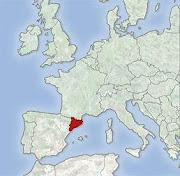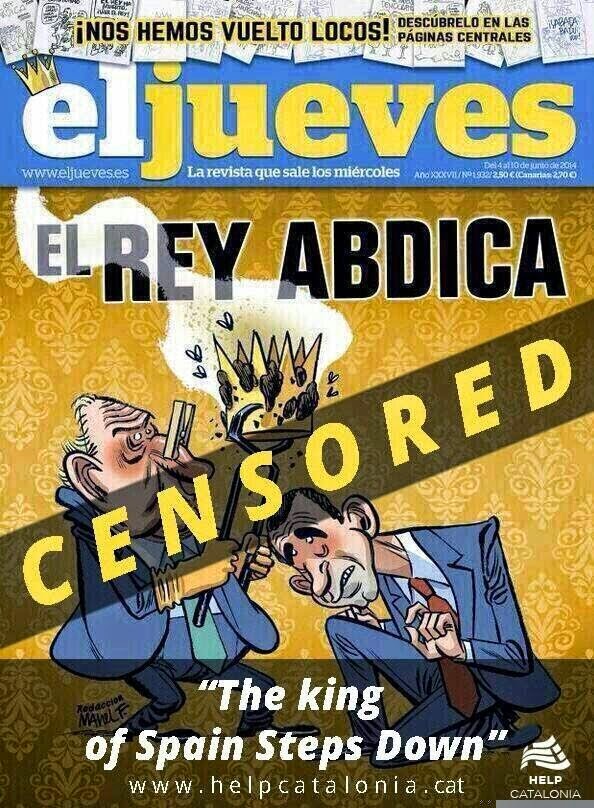
The president of the regional Junta de Andalucía government recently visited Catalonia to campaign against the self-determination referendum called by the Catalan Generalitat government for next November. Along with Spanish Prime Minister Mariano Rajoy and opposition leader Alfredo Rubalcaba, Susana Díaz will complete the Spanish political trident to try and convince the Catalans, all the Spaniards and Europe that Catalan hopes to decide for themselves are impossible to materialize.
It looks like Andalusia is too small for Ms. Díaz and that dedicating her time to solving Andalusians' problems does not fulfill her ambitions. That’s why since she jumped from the ranks of her party to land in the comedy arena into which politics has lately turned, she has devoted herself to showing off and being the celebrity both inside and outside the PSOE socialist party, and following the long tradition of her party, she has become the major
Spanish Jacobin.
The idea of a new productive landmark for Andalusia has been abandoned and its future relies once again on being a subordinate land, a colony, with an economy based on mining and construction —I guess we should also include tourism. So Ms. Díaz has all the time in the world to wrap herself in the Spanish flag and devote herself to the defense of Spain. She has become a missionary and gone to Catalonia, like a modern
Agustina de Aragón, to show the true Spanish spirit and deny the right of Catalan citizens to decide for themselves.
She will have propagandized the federal option supported by her party, a federalism that no one, either inside or out of the PSOE, manages to explain. And she has dared address particularly all the Andalusians who had to migrate to Catalonia, those who along with their children, are now citizens of Catalonia without having to renounce their Andalusian roots —something that is not understood by those who confound nation with state and social integration with loss of cultural identity— who have been refused their nature of being both Andalusian and Catalan. She has tried to convince them to become
disciplesof Lerroux and act as a Spanish fifth column. I believe this is a crass, dangerous maneuver.
During the two-year right-wing government of the Second Spanish Republic, when the president of the Catalan Generalitat Government,
Lluís Companys and other Catalanist politicians were imprisoned at the Puerto de Santa María prison for proclaiming the Catalan State,
Blas Infante and the Andalusian liberalista nationalists, paid them several visits and publicly supported their cause. Is there any doubt as to what would be the position today of those who pay lip service to Mr Infante as the founding father of the Andalusian nation, concerning the Catalans' right to self-determination demanded by a broad majority of Catalonia's citizens? —And if anyone does not agree that they are in fact a majority, or that many of those who defend the right are not strictly in favor of independence, should support the referendum to settle any doubts.
By gatecrashing Catalonia, Susana Díaz, who is not only one of the more influential figures of the PSOE —an indication on how low this party has sunk— but is also the sitting president of Andalusia, does not serve the interests of the Analusians in any way. Among other reasons, this is because she ignores that as a land that considers itself a national reality —and I quote the expression from the
Andalusian Statute of Autonomy —, Andalusia has the same right to decide for itself —as is now the case in Catalonia— as any other national collective. The right to decide on whether to undergo such profound transformations on economic, social or political issues as we may require, whether to adopt the structure of a state or that of a confederation —as Mr Infante defended— or if the current autonomous framework would be enough. One can legitimately disagree about what is most adequate, and unbiased and accurate studies would be needed on the consequences and risks of any option. But what cannot be denied from the start is the right of any people to express their opinion freely and to respect the majority. Whether it is Kosovo, the Western Sahara, Scotland, Catalonia... or Andalusia. Because it is quite simply a democratic right —speaking of which, this right was recognized by the PSOE before its reconversion during the
Spanish political transition.
The fact that the Constitution of 1978 denies the plurinational nature of the Spanish State is a very poor argument to disqualify the forthcoming referendum on November 9th in Catalonia. It plainly reflects the serious democratic shortcomings, in this particular issue and in others, of the Constitution. And it also reveals its strong nationalist character —Spanish nationalism, that is. If former socialist Prime Minister J.L.R. Zapatero and the then leader of opposition Mariano Rajoy changed an article of the Constitution overnight to satisfy the demands of capital investors, no one can say that there can be no amendments in this regard, an issue that affects all the peninsular peoples and their coexistence. If no proposals for reform to match legality with democracy are made, it is because the will to make such a change does not exist. And in this, like so much else, the understanding between the governing Partido Popular and the PSOE is absolute.
Isidoro Moreno Navarro, chair of Social and Cultural Anthropology at the University of Seville, Andalusia.
Awarded with the prizes: “Premio Andalucía de Investigación Plácido Fernández Viagas sobre Temas Andaluces” (2001), “Premio Internacional Etno-demo-antropológico Giuseppe Pitré” (2005) and “Premio Fama” by the Universidad de Sevilla,
1.
Jacobin: At its inception during the French Revolution, the term was popularly applied to all supporters of revolutionary opinions. A Jacobin is someone who supports a centralized Republic. The
Jacobin movement is a radical political option that initially defends freedom and democracy but degenerates into totalitarianism. Jacobins considerer themselves as representantive of the people by pretending to defend vanguardism and the principles of democracy.
2. Lerroux:
Alejandro Lerroux García (La Rambla, Còrdova, March 4th of 1864 – Madrid, June 25th of 1949) was a politic from Andalucía and president of the Spanish government between 1933 and 1935 during the Second Republic. Lerrouxism is a
political movement organized by Alejandro Lerroux in Barcelona to get control over the worker class which is based on republican and anti-Catalan ideologies.
3.
Political Transition: The Spanish transition to democracy was the era when Spain moved from the dictatorship of Francisco Franco to restoration of the Spanish Monarchy. The transition is usually said to have begun with Franco’s death on 20 November 1975, while its completion has been variously said to be marked by the Spanish Constitution of 1978, the failure of an attempted coup on 23 February 1981, or the electoral victory of the Spanish Socialist Workers' Party (PSOE) on 28 October 1982. The transition to democracy brought Spain into NATO.




























